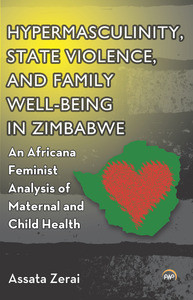Categories
Categories
Authors
Authors
- Home
- Women's Studies
- HYPERMASCULINITY, STATE VIOLENCE, AND FAMILY WELL-BEING IN ZIMBABWE: An Africana Feminist Analysis of Maternal and Child Health, by Assata Zerai
HYPERMASCULINITY, STATE VIOLENCE, AND FAMILY WELL-BEING IN ZIMBABWE: An Africana Feminist Analysis of Maternal and Child Health, by Assata Zerai
HYPERMASCULINITY, STATE VIOLENCE, AND FAMILY WELL-BEING IN ZIMBABWE: An Africana Feminist Analysis of Maternal and Child Health, by Assata Zerai
Product Description
In Hypermasculinity and State Violence in Zimbabwe Undermining Family Well-Being: An Africana Feminist Analysis of Maternal and Child Health, Assata Zerai explores the demography of maternal and child health in Southern Africa from an Africana feminist sociological perspective. She presents a framework that considers the ways that nation, race, class, gender, sexuality, globalization, and other dimensions of oppression intersect to impact upon the experiences and agency of individuals and groups with health care and social support in Zimbabwe. She analyzes data sets from demographic and health surveys for the country. On the basis of the Africana feminist framework, Zerai argues that maternal and child health cannot be understood unless the socioeconomic, political, and cultural contexts are taken into account. She extends and tests the hypothesis that militarism (especially state violence) and hypermasculinity in Zimbabwe have deleterious effects on family well-being in general, and especially on maternal and child health.
This work contributes importantly to the social scientific literature in the social demography of Africa because it adapts the vibrant intellectual work of Africana feminists to a quantitative methodology. Thus the work proposes a new Africana feminist quantitative methodology that could be utilized to study other subject matter. Further, on the basis of this novel methodological approach, this work elicits results that give rise to useful maternal and child health-related policy recommendations.
"Prof. Asata Zerai, an Africana feminist scholar, has written a landmark book based on Zimbabwe's demographic health data. Her book raises troubling connections between hypermasculinity, violence and poor infant and child health in Zimbabwe. Prof. Assata Zerai points out that Zimbabwe's relatively high literacy at ojust over 90% is necessary but not sufficient to avert stunting amongst children given that 33% of children are stunted in their development. This is a damning statistic and situation, pointing to the need to focus on providing clean water and better sanitation amongst the poorest in rural and urban Zimbabwe. Pointing out that till 2005, 10% of children under the age of five, died in Zimbabwe and the figure increased to about 16% by 2010, Zerai's concludes that it is necessary to provide secondary school education, robust health care, water and sanitation infrastructure, diverse economic opportunities for communities and families, minimise gender, political, social and economic inequalities and violence as a means of safeguarding infant and child health in the first instance and for the health of all Zimbabweans. I recommend this book highly for social science and health specialists who are interested in going beyond studying specific social and physiological indicators of health in isolation from their economic, political and social contexts
—Rudo Gaidzanwa, Professor of Sociology and Dean of College of Social Sciences., University of Zimbabwe
“Exaggerated masculinity and state violence have long been close companions, the unsavory duo a grave danger to the health and wellbeing of women and children, especially. Assata Zerai’s searching analysis of postcolonial Zimbabwe artfully unpacks that companionship. The chilling consequences – in maternal and child mortality, malnutrition, and physical and emotional health – are here displayed in a rare synthesis of quantitative methodology and feminist analysis, Africana feminist analysis. It is a singular achievement that will command attention across the social and human sciences, from Africanists, feminists, and scholars of the African diaspora, among others. Through it all, the author’s gaze is firmly fixed on the general reader. Zerai has at once made a unique contribution to scholarship and struggle—the struggle against the multiple and related forms of oppression her book highlights, in and out of Zimbabwe.”
—Michael West, Professor of Africana Studies, Sociology and History at Binghamton University
ABOUT THE AUTHOR
ASSATA ZERAI is Associate Professor of Sociology and African Studies at the University of Illinois Urbana-Champaign. She received her Ph.D. in Sociology from the University of Chicago. Her research expertise includes development and testing Africana Feminist methodologies for social analysis and social organizing. She has used insights from this research to study evangelicalism, anti-war activism, maternal substance use, and child health in sub Saharan Africa, including work on ways to incorporate safe water and sanitation technologies without exacerbating inequality.
SUBJECT CATEGORIES
History, Sociology/AFRICA
 Loading... Please wait...
Loading... Please wait... 


